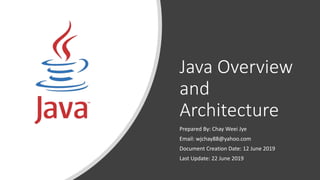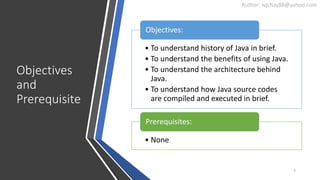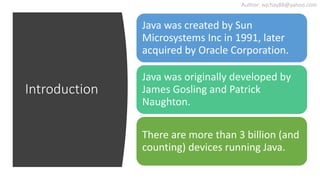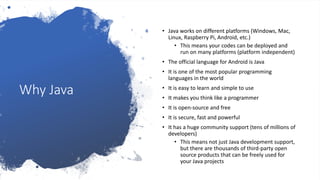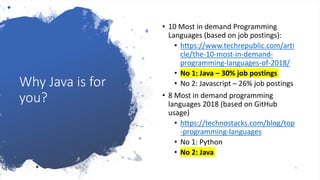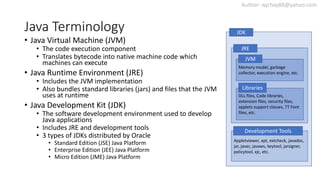Java overview and architecture
- 1. Java Overview and Architecture Prepared By: Chay Weei Jye Email: wjchay88@yahoo.com Document Creation Date: 12 June 2019 Last Update: 22 June 2019
- 2. Author: wjchay88@yahoo.com Objectives and Prerequisite 2 • To understand history of Java in brief. • To understand the benefits of using Java. • To understand the architecture behind Java. • To understand how Java source codes are compiled and executed in brief. Objectives: • None Prerequisites:
- 3. Author: wjchay88@yahoo.com Introduction Java was created by Sun Microsystems Inc in 1991, later acquired by Oracle Corporation. Java was originally developed by James Gosling and Patrick Naughton. There are more than 3 billion (and counting) devices running Java.
- 4. Author: wjchay88@yahoo.com Why Java • Java works on different platforms (Windows, Mac, Linux, Raspberry Pi, Android, etc.) • This means your codes can be deployed and run on many platforms (platform independent) • The official language for Android is Java • It is one of the most popular programming languages in the world • It is easy to learn and simple to use • It makes you think like a programmer • It is open-source and free • It is secure, fast and powerful • It has a huge community support (tens of millions of developers) • This means not just Java development support, but there are thousands of third-party open source products that can be freely used for your Java projects
- 5. Author: wjchay88@yahoo.com Why Java is for you? • 10 Most in demand Programming Languages (based on job postings): • https://www.techrepublic.com/arti cle/the-10-most-in-demand- programming-languages-of-2018/ • No 1: Java – 30% job postings • No 2: Javascript – 26% job postings • 8 Most in demand programming languages 2018 (based on GitHub usage) • https://technostacks.com/blog/top -programming-languages • No 1: Python • No 2: Java 5
- 6. Author: wjchay88@yahoo.com Programming Language used in Popular Websites (Wikipedia – 20 June 2019) • https://en.wikipedia.org/wiki/Programming_languages_used_in_most_popular_website 6
- 7. Author: wjchay88@yahoo.com Java Terminology • Java Virtual Machine (JVM) • The code execution component • Translates bytecode into native machine code which machines can execute • Java Runtime Environment (JRE) • Includes the JVM implementation • Also bundles standard libraries (jars) and files that the JVM uses at runtime • Java Development Kit (JDK) • The software development environment used to develop Java applications • Includes JRE and development tools • 3 types of JDKs distributed by Oracle • Standard Edition (JSE) Java Platform • Enterprise Edition (JEE) Java Platform • Micro Edition (JME) Java Platform JDK Appletviewer, apt, extcheck, javadoc, jar, javac, javaws, keytool, jarsigner, policytool, xjc, etc. Development Tools JRE Memory model, garbage collector, execution engine, etc. DLL files, Code libraries, extension files, security files, applets support classes, TT Font files, etc. JVM Libraries
- 8. Author: wjchay88@yahoo.com Write Once Run Everywhere Compiler (javac) Source code: *.java Byte code (.class) JVM/Interpreter for Windows JVM/Interpreter for Mac JVM/Interpreter for Linux Distribution flow: 1. The same source code is compiled to byte code files (.class) ïƒ Write Once. 2. Byte code files are distributed to various platforms (OS). 3. Each OS will have its own specific JVM and interpreter to convert byte codes to machine codes when executed. ïƒ Run Everywhere.

